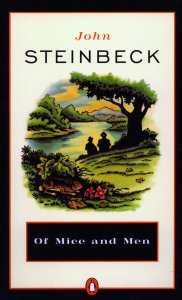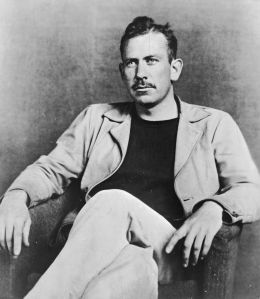Of Mice and Men by John Steinbeck, 1942 – audiobook version narrated by Gary Sinise
I had first read Steinbeck when I was about 11 or 12. We had to read The Pearl (1947) in middle school, and I remember enjoying it. So when I found out he had won a Nobel Prize for Literature in 1962, I jumped at the chance to read another one of his books. I had heard from many people that Of Mice and Men was one of his best works, so I decided to give it a chance. I know most American teenagers probably read it in high school. According to the National Steinbeck Center, “Despite its long-term popularity, Of Mice and Men was banned in many schools and libraries for vulgarity and what some consider offensive and racist language. The novella appears on the American Library Association’s Most Challenged Books of the 21st Century.” It is also interesting to note that 90% of teenagers in Britain have to read it as well because it is “Short, comprising only six chapters, and its themes continue to be considered relevant to 21st Century society.” I’m beginning to think it is a conspiracy that the Nobel committee only chooses authors who write depressing books, or at least that is what I feel like so far in this reading challenge. Maybe it is just from the subject matter they pick to write about, and yes I know it is based off their own person experiences as well. I will make an exception for Pablo Neruda, who while he does have some sad poems, most of his poems are joyous.
John Steinbeck seemed to have a relatively comfortable childhood around Salinas, California (where at least four of his books are based) and had some of a college education. After publishing his first seven or so books, Steinbeck, like Ernest Hemmingway, was also a war correspondant. Steinbeck during World War II and Hemingway with WWI and the Spanish-American War. It is interesting to note that he wrote the screenplay for the movie Lifeboat in 1944, for director Alfred Hitchcock, only to have it drastically changed after he finished it. He tried unsuccessfully to remove his name from the credits. He also wrote the screenplay for Viva Zapata in 1952, about the life of Mexican revolutionary Emiliano Zapata, which starred Marlon Brando and Anthony Quinn. He wrote the book East of Eden, one of his most famous works, which was later turned into the film that starred a young James Dean.
The book Of Mice and Men is about two migrant farm workers named George Milton and Lenny Small in California during the Great Depression. They couldn’t be more different. George is short, quick-thinking, and in charge of the two. Lenny is a big gentle man who has the mentality of a small child. He cannnot fend for himself, and so must travel around California with his friend George. Both men dream of getting a small farm together where they can grow their own food, tend their own animals and “live off the fat of the land”. Lenny is particularly fixated on getting to tend the rabbits. According to the National Steinbeck Center, “A strong desire for the stability and refuge of companionship motivates most of the action in the novella, and the break of the strong homosocial bond between George and Lennie constitutes the work’s closing tragedy. The close friendship between the two men and the simplicity and tenderness of their dream makes Of Mice and Men a compelling psychological glimpse into the lives of migrant field workers, setting the novella apart from Steinbeck’s later, far more encompassing work, The Grapes of Wrath.”
George and Lenny have to quickly leave their last job after a misunderstanding between Lenny and a little girl. They are heading towards a new job in Salinas, California where they will be harvesting grain. We soon meet the other men that work at the ranch. Slim, the foreman, is the leader of their work team and one that everyone respects. Candy is an old man with an even older dog who lost his hand in an accident and is constantly worrying that he will get fired because of his age. Carlson is one of the ranch hands that hates Candy’s dog because of its smell and volunteers to shoot it to put it out of its misery (which of course Candy resents him for). Curley is short, claims he is a prizefighter and is always trying to pick fights with the other men on the ranch because he thinks everyone is messing with his wife. He is the ranch owner’s son, and is married to a young girl who all the men call a tramp, but is really lonely and desires companionship. Crooks is the black stable hand who feels slighted by the other men because of the color of his skin. Candy asks George and Lenny if he can join them on their farm as he has money for a down payment and they agree to have him along to do odd jobs. Slim’s dog has a litter of puppies and Lenny begs for one, and later Slim has to send Lenny away from the barn for petting it too much. Curley takes a dislike to Lenny from the beginning because he is large and tries to pick a fight with him after failing to start one with Slim for hanging around his woman, which gets his hand accidentally crushed by Lenny. Slim tells Curley not to tell the boss about what Lenny did to him and try to get George or Lenny fired, or he will become the laughingstock of the entire ranch for getting his hand crushed by a simpleton. The next night all but Lenny, Candy and Crooks go to a brothel in town. Lenny wanders into Crooks’ room on the side of the barn and talks to him about his dream of living on the farm and tending rabbits, and Crooks foreshadows the end of the book by telling him that he’s heard many men over the years with the same dream who never make it. Candy comes in and convinces Crooks that what Lenny has told them is true. Crooks asks to join them, but they are interrupted by Curley’s wife. She leaves after learning that all the men have gone to the brothel. Alone in the barn the next day, George accidentally shakes his puppy to death after it bites him. He is a bit traumatized by it and frantic because he doesn’t want Lenny to not let him take care of the rabbits on their imagined farm. Curly’s wife walks in and tries to flirt with Lenny, who of course doesn’t really want to talk to her because of George’s previous warnings to stay away from her. He tells her he likes soft things and she offers her silky hair for him to touch. After a short time, she thinks he is messing up her curls and yells at him to stop. He panics, holds on tighter and then puts a hand over her mouth to quiet her down. In their struggle, he accidentally breaks her neck. He is again devastated at his actions because he fears George taking away his rabbit tending rights, and runs away to cover his tracks. George quickly finds out what he has done, and he tells Candy to tell the others. Once Curley finds out, he plots revenge and wants to shoot George in punishment. Lenny manages to get their first and does what he feels is right. Recommended for ages 16+, 4 stars.
I liked George and Lenny’s relationship, which was definitely not the most traditional but it worked for them. Each of them needed companionship and the other filled that role. Lenny could not survive without George and despite George’s objections, I don’t think he wants to live without Lenny. I always feel drawn to characters like Lenny who have mental disabilities as I had a cousin that I was close to growing up that was the same way and I never saw her as different and always treated her the same as everyone else. I liked Slim, who seems to be the only one who has sense. There was a fair amount of cursing, but considering that nearly all of the characters were men and given their profession and lack of education, it is not surprising. Unlike Hemingway, whose book To Have and Have Not was written about the same time (four years earlier) and had similar terminology relating to racism and sexism, and set during the Great Depression, I thought the language was way better in this book. It was actually a joy to read, aside from the depressing storyline. I will admit that I teared up at the end of the book, sitting in my car in the dark to finish it up before I came inside my house last night. I look forward to reading more Steinbeck in the future, and it’s looking like I might try to read East of Eden as two people have recommended it to me.


[…] Of Mice and Men by John Steinbeck […]
LikeLike
[…] 11. Lolita, by Vladmir Nabokov 12. Of Mice and Men, by John Steinbeck – my review posted here […]
LikeLike